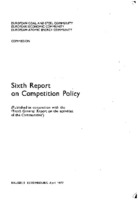| dc.description.abstract | In 1976 the European economy suffered, to differing degrees among the Member States, from persisting and in some cases worsening inflation, unemployment, monetary disturbances and balance-of-payments disequilibria. In the last few years the acquisition of Europe's supplies of energy have undergone a major upheaval. A general dialogue has begun between countries rich in technol-ogy to establish a new and more equitable economic order. Willingly or unwillingly, Europe is in the throes of a long-term process of structural transformation and must somehow restore some kind of equilibrium within a new international divi-sion of labour. In their attempts to solve the most pressing problems, above all that of reconciling stability with full employment, the Community institutions, the Governments of the Member States, business and the trade unions must remember the need for Europe to keep its frontiers open when planning for the future. The emerging industrial structures and new technologies must therefore be competitive. The preservation of the unity of the common market is and remains the basis for all new activities in the field of competition. The illusion that economic and social problems can be solved either by Community or national protectionism, jeopard-izing the unity of the common market, cannot. be maintained. Competition policy is one of the fundamental means for preserving the unity of the market. Its aim is to ensure that business operates along competitive lines, while protecting the consumer by making goods and services available on the most favourable terms possible. It therefore endeavours to cut monopoly profits, to ensure that the economy remains adaptable to circumstances and to stimulate innovation. In Community terms competition policy has to play an ancillary role to other policies, essentially to preserve or restore conditions in which competition can flourish. The fourth medium-term economic policy programme, for example, calls for 'an active competition policy' which can 'improve the effectiveness of the instruments of overall demand management'. Although competition cannot take the place of economic or social policy, it is nevertheless essential to the preserva-tion of the flexibility which the economy must have if it is to remain adaptable. |

